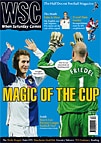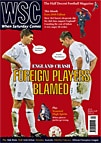 Dear WSC
Dear WSC
Vaughan Roberts asks (Letters, WSC 251) if any of the schoolboys who took part in ITV’s Penalty Prize competition went on to become pros after their appearance in the shootout before the 1974 FA Cup final. Well, at least one did. Stuart Beavon was already on Spurs’ books at the time he put five out of six spot-kicks past Gordon Banks, no less. He made only three first-team appearances for Spurs but became a fixture in Reading’s midfield, playing almost 500 games during the Eighties. His penalty-taking prowess remained intact and in March 1988 he returned to Wembley to put Reading into the lead from the spot as they beat Luton 4-1 in the Simod Cup final. However, Stuart’s most famous penalty was a deliberate miss. Before the FA launch a belated match-fixing inquiry, Stuart’s failure came in Channel 4’s football drama The Manageress. Gabriella Benson/Cherie Lunghi’s team were based at Elm Park and had to win their last game of their season to win promotion and, 1-0 up with a minute to go, conceded a penalty. The script, of course, required the actor keeper to save the spot-kick and Stuart was asked to take the penalty. Apparently, it took ten kicks before the director was satisfied. In Reading’s next game Beavon took a real penalty, which he missed, blaming his failure on becoming accustomed to missing through his TV appearance. That miss cost Reading a win and, nine days later, it also cost manager Ian Branfoot his job, surely the only manager to be sacked because of a TV series.
Alan Sedunary, via email
Read more…
 England need to get Jack Warner on side if they hold any hope of hosting the 2018 World Cup
England need to get Jack Warner on side if they hold any hope of hosting the 2018 World Cup 
